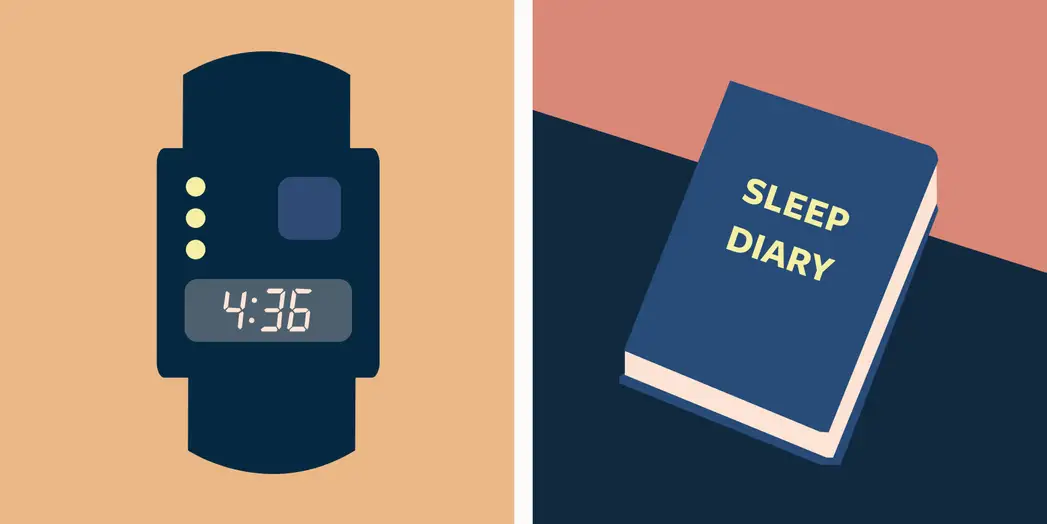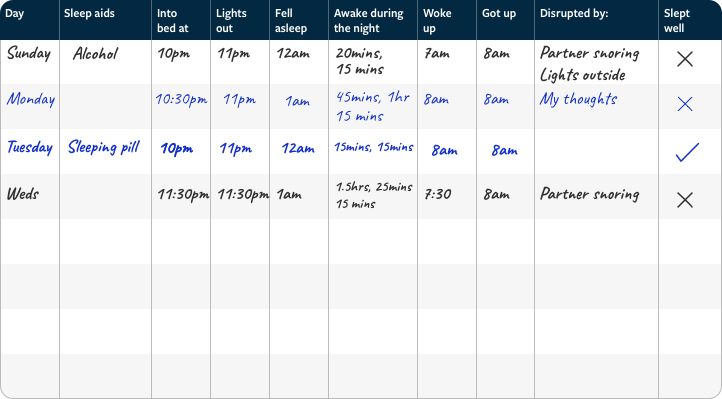How can a sleep diary help?
Sleep diaries can help you discover the bigger picture when it comes to your sleep. By keeping a consistent record of how you’re sleeping you can:
- identify key habits and behaviours that are impacting your sleep
- spot patterns that contribute to good or bad sleep
- have a reliable record of your sleep over a period of time
- pinpoint where you need further support.

Can I use my sleep tracker?
The data that sleep trackers give you isn’t always reliable. Using a sleep diary means you’re focusing on the basics, the key information that really matters. We’d recommend relying on your own thoughts, feelings and interpretation of the night before, not your sleep tracker, when filling in your sleep diary.

Using a sleep diary
How you record your sleep diary is up to you. You can use a pen and paper, a spreadsheet on your computer, whatever is most convenient and you’re most likely to keep doing.
You can make your sleep diary as simple or as complex as you like, but there are some key areas that you should include to get a clear picture of your sleep. These are:
- what time you went to bed
- what time you turned out the lights
- what time you think you fell asleep
- how many times you woke during the night
- how long you were awake each time you woke up
- what time you woke up in the morning
- what time you got out of bed
- if anything disturbed your sleep
- how well you felt you slept
- whether you used anything to help you sleep such as medication or alcohol.
Complete your diary every day for 1–2 weeks. The time of day you fill this in is up to you. You might like to set a reminder on your phone to do this so you don’t forget.
What our users say about sleep diaries
Don’t underestimate how useful sleep diaries can be when improving your sleep. This is what some of our users said once they started using this simple but invaluable tool:

Sharon
61, from West Essex
I liked the structure and the engagement with the therapists. The process works and the daily sleep diaries kept me focused and on track.

Madeleine
63, from Suffolk
The diary really helps as I’m sleeping more than I thought I was. It’s one less worry seeing how long I have slept in black and white. I am feeling confident that it’s going well.

Finley
41, from UK
I find keeping a daily sleep diary helps me to identify trends and question my perception on good vs bad nights.

Becci
35, Intensive Care Registrar
Accountability of completing diaries really has dramatically and quickly reset my schedule.
Download your sleep diary template

We’ve created a straightforward sleep diary for you to download, print and use.
Evaluating your diaries
After you have a week or two of completed diaries, it’s time to take a look at all the information you’ve gathered. Try to spot any noticeable patterns. Have you noticed:
- any regular disruptions
- if earlier or later bedtimes impact your sleep
- if using different sleep aids affects how you feel during the night or the next day?
Your sleep diaries are just the beginning
Tracking your sleep is a powerful first step but knowing what to do with that information is where real change begins. At Sleepstation, our sleep coaches know exactly what to look for. They’ll help you to:
- spot patterns and triggers you might miss
- interpret your sleep data and discuss next steps
- uncover the root causes of your sleep issues
- guide you with a tailored plan that works.
You don’t have to figure it out alone. Let’s turn your sleep diary into a roadmap to better sleep.
